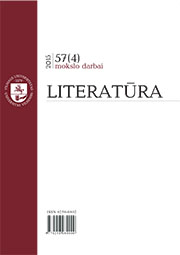KALTĖS METAMORFOZĖS ALBERT’O CAMUS ROMANE KRYTIS
THE METAMORPHOSES OF GUILT IN ALBERT CAMUS’S NOVEL THE FALL
Author(s): Jurate Jasaitytė, Vytautas BikulčiusSubject(s): Language and Literature Studies, Studies of Literature, French Literature, Theory of Literature
Published by: Vilniaus Universiteto Leidykla
Keywords: guilt; individual; collective; Dasein; das Man; authentic and inauthentic existence; death; care, fall; sociocultural context; consumerism
Summary/Abstract: The representation of the phenomenon of guilt in Albert Camus’s novel “The Fall” (1956) is analysed using the approach of the relation between individual and collective. The methodology of the Master’s thesis is based on M. Heidegger’s analysis of Dasein, J. Baudrillard’s sociological and philosophical conceptions, and the comparative thematology, which unifies the separate parts of the present research.In this paper, guilt is interpreted as the polysemantic and multiple phenomenon consisting of the separate, but together related phases, also known as metamorphoses. These metamorphoses change one another until the final result is available, i.e. the particular form of guilt is formed. The experience of guilt, which is depicted in the chosen novel, is analysed both as the process and the result. It involves four different types of metamorphoses: innocence or unconscious guilt; feeling guilt for somebody / something; transgression; initial or general guilt. Although the structure of guilt is common,every metamorphosis forms the variable modes of its experience and perception. Also the level of the interiorization of guilt varies from its acceptance to avoidance.Firstly and mostly, an individual is declared to be “the guilty” when he / she does not accomplish the duties, which are collectively meaningful. However, guilt is also attributed to collective as a common feature of its workings. Therefore, none of collective members can no longer be presumed innocent or to believe that he / she could avoid the guilt. The hero of Albert Camus’s novel “The Fall” Jean-Baptiste Clamence becomes a “judge-penitent”, who declares his peculiar philosophy of guilt.Every metamorphosis of guilt takes its place in the whole process of transformation, which changes the individual’s characteristics and the manner of his / her interaction with collective. Guilt could be interpreted as the moment of open truth, the attribute of inevitable individual’s existence in collective.
Journal: Literatūra
- Issue Year: 57/2015
- Issue No: 4
- Page Range: 35-58
- Page Count: 24
- Language: Lithuanian

